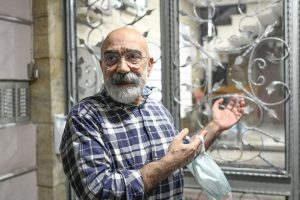Turkey: How Erdogan’s pledge for reform collapsed in five months
by Burak Bekdil
- “We don’t see ourselves elsewhere but in Europe,” Erdoğan said on November 21. “We envisage building our future together with Europe.”
- According to Turkish news site Gazete Duvar, a total of 128,872 people have been indicted in the past six years for insulting Erdoğan. Of those, 27,824 had to stand trial and 9,556 were convicted.
- Apparently, Erdoğan wants a democratic system without opposition.
- But who cares about the Constitution in a country where the governing bloc is proposing to close down even the Constitutional Court, in addition to banning opposition parties? All these autocratic measures occurred in the less than half-year since Erdoğan pledged democratic reforms.
- A few years ago, then Prime Minister Ahmet Davutoğlu had vehemently refuted claims that Turkey was a second-class democracy. He was right. Turkey has since remained a third-class democracy.

Turkish journalist and writer Ahmet Altan poses for AFP at his home minutes after he arrived following his release from jail, at Kadikoy neighbourhood in Istanbul, on April 14, 2021. – A Turkish court on April 14 released journalist and novelist Ahmet Altan after more than four years in prison on charges of involvement in a failed 2016 coup attempt that he had always denied. The Court of Cassation ruling came a day after the European Court of Human Rights (ECHR) demanded the 71-year-old’s freedom in a verdict that accused Turkey of violating his civil rights. The award-winning novelist and newspaper editor was jailed after writing politically-sensitive pieces critical of President Recep Tayyip Erdogan and in support of Kurdish rights. (Photo by BULENT KILIC / AFP) (Photo by BULENT KILIC/AFP via Getty Images)
| 71-year-old journalist and author Ahmet Altan was released from prison in Turkey this month. He had been unlawfully imprisoned for nearly five years, since he was detained in 2016 over allegations that, during a TV program, he disseminated “subliminal messages” related to a coup attempt, as well as for articles he had written criticizing the government. Pictured: Altan arrives at his home in Istanbul following his release from prison on April 14, 2021. (Photo by Bulent Kilic/AFP via Getty Images) |
His critics often joke that when President Recep Tayyip Erdoğan pledges democratic reforms, one should run away immediately. His latest charm offensive in November, aimed at repairing Turkey’s badly-strained ties with the West and Western institutions, has proven that the joke still holds value.
“We don’t see ourselves elsewhere but in Europe,” Erdoğan said on November 21. “We envisage building our future together with Europe.” Two days later, Defense Minister Hulusi Akar described NATO as the “cornerstone of our defense and security policy” and said that Turkey was looking forward to cooperating with the incoming administration under Joe Biden in the United States. Erdoğan also promised a bold package of democratic reforms.
Less than five months later, Italy’s Prime Minister Mario Draghi had to call Erdoğan a “dictator.” That was not because an experienced European politician wanted to insult a Muslim head of state.
According to Turkish news site Gazete Duvar, a total of 128,872 people have been indicted in the past six years for insulting Erdoğan. Of those, 27,824 had to stand trial and 9,556 were convicted. By comparison, only 11 Turks had been convicted for insulting Ahmet Necdet Sezer, president between 2000 and 2007.
After Erdoğan’s latest reform pledge, on March 21, Turkish authorities arrested a pro-Kurdish opposition MP who had refused to leave parliament for several days after his seat was revoked. Ömer Faruk Gergerlioğlu “was brought out by force while he was in pyjamas and slippers” by “nearly 100 police officers,” the leftist Peoples’ Democratic Party (HDP) said in a statement.
On March 17, the Supreme Court Chief Public Prosecutor’s Office filed a lawsuit against HDP for its closure on the grounds that it has links with “terror acts.” On April 14, state prosecutors asked for the removal of the parliamentary immunity of main opposition leader Kemal Kılıçdaroğlu and nine MPs from his Republican People’s Party (CHP). Apparently, Erdoğan wants a democratic system without opposition.
This month, Europe’s top human rights court ruled that the right to liberty and freedom of expression of Turkish journalist and author Ahmet Altan had been violated due to his detention and imprisonment on charges related to a 2016 coup attempt. Altan, 71, has been in prison since September 2016, when he was detained over allegations that, during a TV program, he disseminated “subliminal messages” related to the coup attempt, as well as for articles he had written criticizing the government. Shortly after that ruling, the Turkish Court of Appeals released Altan. In other words, Altan had been unlawfully imprisoned for 55 months, nearly five years.
That was “normal” in a country where an army of pro-government judges has the habit of announcing rulings in defiance of rulings from superior Turkish courts, including the Constitutional Court, and from the European Court of Human Rights. Those judges who dare make “undesirable verdicts” are probed and often get disciplinary punishments. Erdoğan’s coalition partner and staunchest political ally, ultra-nationalist leader Devlet Bahçeli, has called for the closure of the country’s top judicial institution, the Constitutional Court.
On April 5, Turkish prosecutors detained 10 retired admirals over their public criticism of Erdoğan’s multi billion-dollar Istanbul canal project, which will create a new artificial waterway from the Black Sea to the Marmara Sea, to complement the Bosporus Strait. The arrest warrants came a day after a group of 104 former senior navy officials signed an open letter warning that the proposed canal could harm Turkish security by invalidating an 85-year-old international treaty (the Montreux Convention) designed to prevent militarization of the Black Sea. Pro-Erdoğan officials and prosecutors interpreted the statement as a direct challenge from the military to the civilian government, “echoing coup times.”
The prosecutors’ move is in direct breach of the Article 26 of the Turkish Constitution:
“Everyone has the right to express and disseminate his/her thoughts and opinions by speech, in writing or in pictures or through other media, individually or collectively. This freedom includes the liberty of receiving or imparting information or ideas without interference by official authorities. This provision shall not preclude subjecting transmission by radio, television, cinema, or similar means to a system of licensing.”
But who cares about the Constitution in a country where the governing bloc is proposing to close down even the Constitutional Court, in addition to banning opposition parties?
All these autocratic measures occurred in the less than half-year since Erdoğan pledged democratic reforms. But no story would be completely Turkish without an element of black humor: Where is the $128 billion?
That sum refers to the US dollars sold by state banks to support the Turkish lira in foreign exchange markets. The policy began around the time of the March 2019 municipal elections and was ramped up in 2020, when the pandemic laid bare the lira’s vulnerability and Turkey’s reliance on external funding. Bankers have calculated that the sales totaled $128.3 billion in 2019-20.
As government officials remain mute on the question, the main opposition CHP recently launched a campaign to embarrass Erdoğan’s ruling Justice and Development Party (AKP) by hanging huge posters on CHP party buildings across the country with the simple question: Where is the $128 billion? Not one more word. Not one single comment or insult. Just a question, though annoying especially at a time of economic crisis.
Turkish police started to rip down those posters without court orders. As one prosecutor confessed in a letter to a governor, “We cannot find a legal pretext to declare the posters illegal. You must rip them down citing administrative reasons.”
In protest, a CHP MP hung the same poster outside his office office window in the parliament building. Parliament’s administrative directors had to send a fire truck to rip down the poster. The MP said he would hang it again.
Erdoğan’s efforts to hang onto power is taking uglier shapes every new day. A few years ago, then Prime Minister Ahmet Davutoğlu had vehemently refuted claims that Turkey was a second-class democracy. He was right. Turkey has since remained a third-class democracy.
Burak Bekdil, one of Turkey’s leading journalists, was recently fired from the country’s most noted newspaper after 29 years, for writing in Gatestone what is taking place in Turkey. He is a Fellow at the Middle East Forum.
https://www.gatestoneinstitute.org/17301/erdogan-reform-collapse

